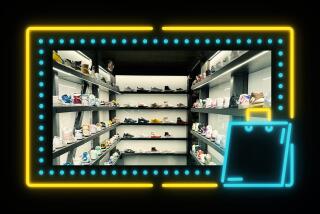It’s All About Loyalty, Trust
- Share via
In 1970, Richard Leff co-founded Ditto Jeans, helping to create one of the first companies to specialize in bluejeans for women. When the company was sold to Jordache in 1980, it was doing more than $30 million in sales and $14 million in licensing annually. After working as a consultant and video store owner for about a decade, Leff purchased a small company in 1991 that sold partitions and office furniture. Leff spoke to freelance writer Karen E. Klein about how he has learned to expand his company by expanding his product line and services.
*
I’ve always felt that there were two ways a company could grow: Push or pull. Since Day 1, we’ve been pulled into growth. When I bought this company, it had four employees and was making less than $200,000 a year. We were selling office furniture to our customers, most of whom were in the middle of a remodel or starting from scratch trying to furnish new office space. The clients wanted interior walls, carpeting, furniture, cabinets, everything. But most companies either make the walls or they make the furniture.
I realized that if we could show these customers that we were competitive in other areas, why would they want to make five or 10 phone calls when we could do all the work for them with one call? I decided that we needed to become a one-stop shop, so we began to develop relationships with good, reliable subcontractors and brought them in under our banner in an informal way on various jobs.
Now, along with furniture and indoor walls, we can offer carpeting, ceiling and flooring, plumbing, air conditioning--all kinds of products and services. Our customers just love it, because with one telephone call we can do as much or as little as they want us to. And the subcontractors that work with us love it because jobs get dropped in their laps, and many of them don’t have the budget to do a lot of advertising and marketing themselves. We’ve gotten to a point with certain subs where we’ve become so important to them that we get a kind of “favored-nation” status: They give our jobs priority because they are smart people who recognize that we’ll be there for them, throwing work their way, all year long.
This is a lesson I learned with Ditto. In the apparel industry, quite often, if you’re selling [to] department stores, you can’t sell a chain, or you can’t sell a discounter, because of the snob factor and the reality that department stores mark up their products differently than chain outlets like Wal-Mart or Kmart do. What I did with Ditto was make it a public franchise. I developed brand recognition that was so strong it overcame the customers’ loyalty to the retailers. So whenever a department store tried to muscle me around and say, “You can’t sell me if you also sell Penney’s,” I would ask them where their customer was going to buy her Dittos--at Penney’s or at their store? If she could find Dittos at their store, she’d also buy a belt and a blouse and shoes there, too.
I’m developing the same kind of brand recognition with Built Rite, gaining customer support, loyalty and trust for the company rather than for the individual products and services we sell.
Of course, since we are building a franchise with our customers, we have a rule that if the subs want to work with us, they have to work as part of our team. We do not tolerate them giving out individual business cards to our end-users. We’re doing all the marketing, selling and advertising for them and giving them the jobs.
The other thing is, we’ve made sure to develop a very good reputation for doing what we say we’re going to do. If there is a bump in the road, I don’t sweat the small stuff. I take care of it and make sure that everything is worked out with the customer. The most important thing on our end is to get our customers’ locations up and running on time. We set the tone and the timetable for the rest of the project getting completed, because until our walls are up, they can’t run the phone lines or the electrical wires into the space. So they run on our timetable, and they appreciate it when we stay right on track.
It’s a great thing to call on clients and talk to them about their jobs and see how excited they get when they realize we can do all these things for them, because they realize that it’s going to be a lot less wear and tear on them.
*
If your business can provide a lesson to other entrepreneurs, contact Karen E. Klein at the Los Angeles Times, 1333 S. Mayflower Ave., Suite 100, Monrovia, CA 91016 or at kklein6349@aol.com.
(BEGIN TEXT OF INFOBOX / INFOGRAPHIC)
At A Glance
* Company: R2 Investments Inc., doing business as Built Rite
* Owners: Richard Leff and Robert Milman
* Nature of business: Makes, distributes and installs office furniture and partitions
* Location: 338 N. Avenue 21, Los Angeles 90031
* Founded: 1970s
* E-mail: rleffsocal.rr.com
* Web site: https://www.builtrite.com
* Employees: 23
* Annual revenue: $2.75 million
More to Read
Inside the business of entertainment
The Wide Shot brings you news, analysis and insights on everything from streaming wars to production — and what it all means for the future.
You may occasionally receive promotional content from the Los Angeles Times.










